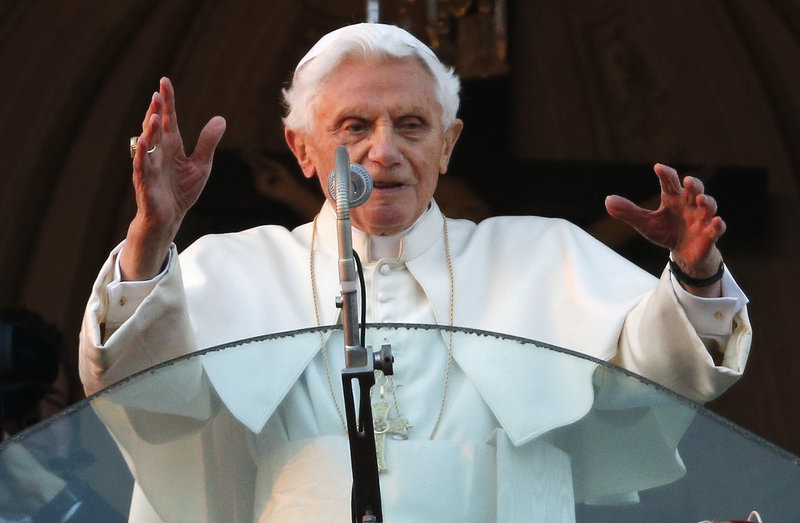CASTEL GANDOLFO, Italy – Benedict XVI left the Catholic Church in unprecedented limbo Thursday as he became the first pope in 600 years to resign, capping a tearful day of farewells that included an extraordinary pledge of obedience to his successor.
As bells tolled, two Swiss Guards standing at attention at the papal palace in Castel Gandolfo shut the thick wooden doors shortly after 8 p.m., symbolically closing out a papacy whose legacy will be most marked by the way it ended — a resignation instead of a death.
Benedict, who will spend his first two months of retirement inside the palace walls, leaves behind an eight-year term shaped by struggles to move the church beyond clerical sex-abuse scandals and to reawaken Christianity in an indifferent world — efforts his successor will now have to take up.
For the time being, the governance of the Catholic Church shifts to Cardinal Tarcisio Bertone, the camerlengo, or chamberlain, who along with the College of Cardinals will guide the church and make plans for the conclave to elect the 266th leader of the world’s 1.2 billion Catholics.
One of Bertone’s first acts was to lock the papal apartment inside the Vatican. In another task steeped in symbolism, he will ensure that Benedict’s fisherman’s ring and seal are destroyed.
On Benedict’s last day, the mood was vastly different inside the Vatican than at Castel Gandolfo. At the seat of the popes, Benedict’s staff tearfully bade the pontiff good-bye in scenes of dignified solemnity. A more lively atmosphere reigned in the countryside, with well-wishers jamming the hilltop town’s main square shouting “Viva il Papa!” (Long live the pope!) and wildly waving the yellow and white flags of the Holy See.
“I am simply a pilgrim beginning the last leg of his pilgrimage on this Earth,” Benedict told the cheering crowd in his final public words as pope.
It was a remarkable bookend to a papacy that began on April 19, 2005 with a similarly meek speech delivered from the loggia overlooking St. Peter’s Square, where the newly elected Benedict said he was but a “simple humble worker in the vineyard of the Lord.”
Over eight years, Benedict tried to set the church on a more traditional course, convinced that all the ills afflicting it were a result of a misreading of the reforms of the Second Vatican Council.
His successor is likely to follow in his footsteps given that the vast majority of the 115 cardinals who will elect the next pope were appointed by Benedict himself and share his conservative bent.
For the most part, his cardinals have said they understood Benedict’s decision. But Sydney Cardinal George Pell caused a stir on Thursday by saying it was “slightly destabilizing” – a rare critique of a pope by one of his cardinals.
Send questions/comments to the editors.



Success. Please wait for the page to reload. If the page does not reload within 5 seconds, please refresh the page.
Enter your email and password to access comments.
Hi, to comment on stories you must . This profile is in addition to your subscription and website login.
Already have a commenting profile? .
Invalid username/password.
Please check your email to confirm and complete your registration.
Only subscribers are eligible to post comments. Please subscribe or login first for digital access. Here’s why.
Use the form below to reset your password. When you've submitted your account email, we will send an email with a reset code.